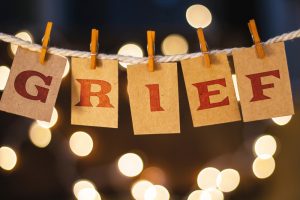 The holiday season can be festive. But there are many folks who experience a great deal of sadness and grief during this time of year because we’ve experienced loss. Holidays can be especially difficult for solo parents and kids who are grieving what they’ve lost– or never had. But we can learn how to move through grief by becoming aware of the stages of grief and acknowledging our grieving. Awareness is the first stage of healing.
The holiday season can be festive. But there are many folks who experience a great deal of sadness and grief during this time of year because we’ve experienced loss. Holidays can be especially difficult for solo parents and kids who are grieving what they’ve lost– or never had. But we can learn how to move through grief by becoming aware of the stages of grief and acknowledging our grieving. Awareness is the first stage of healing.
Grief is a process, which has no timeline. There is no way of knowing how long grief will last. However, there are five identifiable stages. It is possible to determine when someone is progressing versus getting stuck. Being stuck happens when people don’t talk about their experiences, and are unable to resolve their feelings, thus finding themselves frozen in one particular stage of grief, unable to move forward into the next stage, which prolongs the process.
The stages of grief are as follows:
- Denial – the initial period of shock in which one simply goes numb; aka, nature’s grace period.
- Anger/Blame – a time in which one begins to feel angry toward the situation, surviving individuals, themselves, those they feel are responsible for the loss, etc.
- Bargaining – a period which can occur even prior to a loss—i.e., “I will devote my life to you, God… Just please don’t take my mother.” After a loss, it is a time when one will do anything in an attempt to make the reality of the loss go away; even questioning what could have prevented it.
- Depression – the period in which one succumbs to the overwhelming pain of the reality of the loss and loses interest in most everything else, crying uncontrollably, experiencing interrupted or too much sleep and appetite changes.
- Acceptance – the final period in which one accepts the reality of the loss, resolves the multitude of emotions, gains a sense of closure and attempts to move forward with their lives. It is NOT to be confused with being “over” the loss. It is simply an acceptance of the new normal.
With the exception of the final stage, there is no exact order to the grief process. So, it’s important to note the process is not chronological or linear, and these stages do not necessarily occur exclusively, lasting for months at a time. In fact, it is possible to revisit stages within minutes or hours of each other, experience a few simultaneously and—again—get stuck in a stage for long periods of time–or even a lifetime.
The grief process also knows no limitations. It doesn’t discriminate, and—like the heart—it knows no hierarchy. It shows up with the loss of people, pets, relationships, jobs, etc., and the process does not stop until the point of acceptance is reached. No calendar day is immune; not even happy holidays.
But we can use the holiday season to face and possibly re-frame the painful experience, together.
Holiday gatherings and vacation can present a lovely opportunity to employ storytelling, writing, and heartfelt, honest communication, as a means of positive coping. Sharing stories or pictures of the deceased loved one, absent partner or parent, family pet, etc., helps everyone face the pain and work through the emotions and resulting stages. Writing letters—even if they are left unsent—to the deceased or absent person or part of the individual’s life allows each person a chance to say everything they need or want to say to the person they’ve lost.
Now, it is important to remember that the purpose is not to rescue anyone from the pain of grief; nor is it to force them to “snap out of it,” or “get over it.” The point is to simply acknowledge and honor the experience, rather than pretending—for the sake of the holiday season—it doesn’t exist. It is a healthy way to re-frame a painful holiday season and learn to gently face the elephant in the room—seated at the holiday dinner table—together.
For more information: http://grief.com/the-five-stages-of-grief/
Source: www.grief.com





